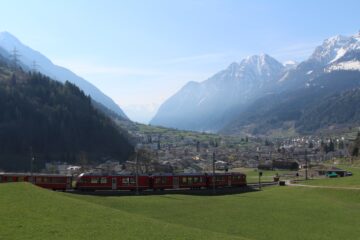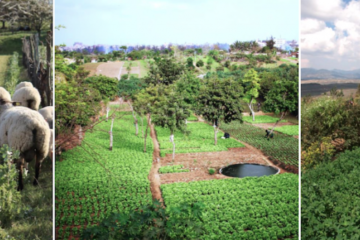
Master thesis: Foresight analysis of the value chain of Tête de Moine PDO cheese.
- Desired profile
- Currently in or finishing graduate studies
- Fluency in French, English (meetings with European partners), optional Spanish
- Taste for field research
- Commitment to agriculture and climate issues
- Analytical and writing skills
- About the MOVING project
The internship will take place within the association Origin for Sustainability, which is a partner in a European and Swiss research project on the future of value chains in mountain regions in the context of climate change. This project, called MOVING, brings together 23 mountain areas from 16 countries to examine the impact of and adaptation to climate change on the sectors.
In the Swiss Jura, this project brings together local stakeholders around the Tête de Moine PDO cheese sector, in order to assess its current and future potential weaknesses and strengths. The study will take into account environmental aspects, socio-economic realities and all the factors of change at play. On the basis of possible scenarios, the MOVING project aims to raise awareness and communicate the needs of the sector and to guide the preparation of appropriate public policies that best support the adaptation and resilience of the actors involved.
More information on the MOVING project and on the ongoing activities is available on the official website: https://www.moving-h2020.eu/
MOVING receives funding from the European Union’s Horizon 2020 research and innovation programme under grant agreement No. 862739. The content of this document does not reflect the official opinion of the European Union. Responsibility for the information and views expressed therein lies entirely with the author(s).
- Internship context
Main objective: To help on the design and carry out of foresight exercises based to enable the regional, cross-regional and EU CoPs to co-construct the shared, strategies and policies that might shape the future towards more sustainable and resilient mountain territories.
Specific objectives
- To identify the socio-ecological drivers and game-changers (social dynamics, technology pathways, development strategies, policy environments) that will shape the future of mountain VCs by 2050.
- To produce (4) H2050 scenario narratives based on potential future scenario frames to assess the strategic options for the evolution of mountain VCs at European and regional levels.
- To conduct foresight exercises at local, cross-regional, and pan-European levels.
- To provide visions of future trends and dynamics that permit identifying policy gaps and policy modernization needs to face the challenges identified in the scenarios.
DESCRIPTION OF WORK
Foresight exercises will be developed at regional, cross-regional and pan-European levels. Regional foresight analysis will be conducted in the 23 case studies in the reference regions by creating a participatory co-learning and co-design framework between stakeholders and researchers. Each foresight group will consist of 8 to 12 stakeholders selected from the regional MaPs members based on their representativeness, knowledge and willingness to participate. A similar exercise will be performed in the thematic clusters identified in WP5. Finally, a pan-European analysis will be developed with the stakeholders involved in the EU MaP.
The foresight exercise will provide a set of scenarios (4), including:
a) a narrative on how the VCs taken into consideration will affect the resilience and the sustainability of the area (based of the WP3 and WP4 results);
b) a set of economic, social, and ecological indicators (provided by WP2 and used in WP4 for the present-day assessment of vulnerability/sustainability), that will show the distance from the baseline scenario.
The baseline scenario for each reference region will be elaborated in collaboration with WP4 and WP5.
TASK 6.1 GUIDELINES TO FORESIGHT (L: ORIGIN; P: UNIPI, INRAE, HUTTON; ALL PARTNERS WITH REGIONS) (M21-M29)
This task will develop guidelines on how to conduct the foresight exercises. The foresight exercise will be a mix approach combining qualitative and quantitative parts, in a 6 steps process: (1) As regard to any foresight exercise, the scope and in particular the focus of the foresight has to be clear enough to run the participation of stakeholders and experts in an efficient way. This scope answers the question “What are the key factors we would like to know about the future in order to improve the quality of our decisions?” and turn around the expected output, in a strategic policy options repertoire. Choosing precisely the most relevant policies will be guided by their influence on resilience and sustainability of the VCs. (2) Identification of Social, Technological, Economic (macro), Environmental, Political and Values (STEEPV) drivers, based on the results of WP2-5. (3) Ranking by importance and uncertainties. The aim is to identify the two or three factors or trends that are the most important and the most uncertain. As outcome of this sorting, it is then possible to focus the attention and the selection of the scenario logics in the next step. (4) Selecting key axis around which scenarios logics are built on. (5) Developing narratives for 4 scenarios for each case studies, for the clusters and finally for the European level (6) Exploring and describing the implications of each scenario, turning the future evolutions into policy strategic options which makes sense at first VCs levels, and then clusters and European levels.
The first will be a baseline scenario, which will forecast the continuation of the key variables without any major change but will build on the current market, policy, technological and social opportunities, as identified by the local stakeholders and external experts in taking inspiration from the lessons learnt taken out the benchmarking of synthetic review of 400 mountain VCs and in-depth analysis of the 23 case studies.
The guidelines will circulate among the partners involved in their implementation, to get a feedback to the draft. After delivery of the final guidelines, and based on enriched literature review and the conceptual framework from WP2, researchers will carry on a contextualization and an adaptation of the guideline for each case study.
Internal training will be performed (webinars) to train the researchers in charge of implementing the foresight exercises. Training will include: the introduction of the theoretical basis of the foresight approach and the conceptual framework (output of WP2); the procedure for carefully selecting and recruiting participants from the different MaPs levels as well as relevant experts, NGOs or key decision-makers; the setting-up of the foresight groups; the training to specific skills and methods to facilitate the participatory workshops; the different stages of the foresight exercise; the technique to elaborate the scenarios and their narratives; the use of the visualization’s tools developed in WP3; the techniques to properly record the discussions; the techniques of the content’s analysis of the discourses.
TASK 6.2 LOCAL, CROSS-CASE AND PAN-EUROPEAN FORESIGHT WORKSHOPS (L: ORIGIN; P: AEIDL, UNIPI, AREPO AND ALL PARTNERS WITH REGIONS) (M30-M37) (février 2023-août 2023)
For each foresight exercise, different meetings will be organised: i.e., 3 workshops per reference region with the foresight group (8 to 12 relevant stakeholders and external experts); 1 cross-case workshop in each of the clusters identified in WP5 (a group of 15 to 20 selected experts for each cluster, all speaking English) and 1 pan-European English speaking (25 to 40) experts’ workshop. ORIGIN with the support of AEIDL and UNIPI will oversee the implementation of the foresight methodology.
The first workshop will (a) elaborate a baseline scenario based on the results of WP3 and take inspiration from T4.6 and the comparative work done in T5.3 (answering the question: “what if we take advantage of all possibilities we have identified in the current state of market and policies?”), and (b) identify the key variables that will influence the VC in the future, structuring the axis of the scenarios.
In the second workshop, the foresight group will (a) give feedback on the 4 scenarios proposed by the research team, and based on assumptions made on the variation of the key variables identified in the first workshop, and (b) choose and contribute to building 2 normative scenarios (based on the refining of the choice of key variables and their valuation according to a converging “desired future”, which should take as well into account their probability of occurrence), and (c) brainstorm about strategic and support policy options related to each (answering the question: “what should change if this scenario happen?”). In this workshop, the scenarios and their respective impacts will be presented with the visual tools developed in WP3. All stakeholders’ opinions, including ‘dissent’ positions, will be documented and illustrated.
In the third workshop, the scenarios (including ‘alternative’ and ‘consensus’ scenarios) will be finalized, with their related strategic changes and policy options. The participants will give feedback on a preliminary draft list of selected resilience and sustainability indicators to measure the gap between these 2 future desired scenarios and the baseline scenario. A preliminary discussion of the policy needs to enable sustainable and resilient mountain areas will be assessed by the participants and feed WP7.
Cross-case workshops will be a follow-up of cross-case comparison and benchmarking carried out in WP5, and the organization of cross-case workshops will be done in collaboration with WP5 leaders. They will work with the scenario narratives developed for the regional exercises but will enlarge the analysis to include cross-regional interactions.
Finally, the scenarios and policy options will be discussed at a pan-European level in order to draw conclusions about European policy actions that could support the emergence and happening of the best local and regional scenarios. The pan-European workshop will be carried out in collaboration with AEIDL and with the support of the Environmental Change Institute of the University of Oxford, which will implement the modelling at the European level with the web platform from the FP7-project IMPRESSIONS. This workshop will be held in Brussels with selected members from the EU MaP and invited experts.
Online webinars will be organized prior to each stage to further inform and tackle all issues and after each workshop, for gathering feedback to address issues and initiate a participatory assessment.
TASK 6.3 QUANTITATIVE SURVEY AMONG THE STAKEHOLDERS (L: ORIGIN; ALL PARTNERS WITH REGIONS) (M38-M40)
In the end, quantification will be carried out, through a questionnaire turning the assessment of the 2 most preferred scenarios and their related most preferred policy options into an evaluation of impacts, through the Likert scale. This questionnaire will be elaborated in English and then, translated into all other needed languages by the operating consortium partners, administered face-to-face to a group of stakeholders (representatives of ages, genders, education and of sectors of activities) in the 23 reference regions (in order to get 30 to 100 answers for each, depending of the case study). This will allow for gathering their preferences and getting accurate data on quantitative evaluation of scenarios and policy options (based on a consolidated set of a few common indicators).
TASK 6.4 SYNTHESIS OF THE STUDY CASES (L: ORIGIN; P: UNIPI, INRA, HUTTON; ALL PARTNERS WITH REGIONS) (M32-M40)
Based on the results of the regional, cross-regional and European exercises, a synthesis report will be carried out to provide a comparative overview of all scenarios and a Repertoire of Strategic Options (possible responses of the stakeholders to tackle the challenges). The partner responsible for every case study will draft a report on the results of the foresight exercise [internal working document] including the strategic local, national and European policy options. The analysis of the outputs of foresight exercises will allow for building a Repertoire of Strategic Options, including an analysis of the policy needs to shape the building of sustainable and resilient mountain value chains. The main results will be gathered in a policy brief that will feed WP7, in addition to policymakers at regional, national and European levels.
- Conditions
Duration
First semester 2023 (ideally between mid-January and mid-July).
Part-time internship for students working in parallel on their thesis (17.5 hours/week).
Location
The internship site is in Switzerland (Jura), and the rest of the work can be done remotely. Some travel is required to meet the actors (1 to 3 trips during the 6 months of the internship (France and Switzerland).
Compensation
According to the agreement with the partner school or university.
Contacts
- Isabella Smith – Origin for Sustainability Communication Manager, isabella@origin-for-sustainability.org
- Dominique Barjolle – President of the association Origin for Sustainability, dominique@origin-for-sustainability.org


